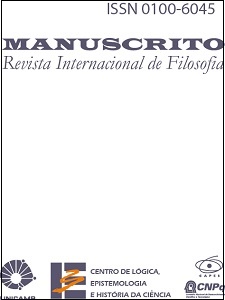Abstract
In its strongest, unqualified form the principle of wholistic reference is that each and every proposition refers to the whole universe of discourse as such, regardless how limited the referents of its non-logical or content terms. Even though Boole changed from a monistic fixed-universe framework in his earlier works of 1847 and 1848 to a pluralistic multiple-universe framework in his mature treatise of 1854, he never wavered in his frank avowal of the principle of wholistic reference, possibly in a slightly weaker form. Indeed, he took it as an essential accompaniment to his theory of concept formation and proposition formation. Similar views are found in later logicians, and some of the most recent formulations of standard, one-sorted first-order logic seem to be in accord with a form of it, if they do not actually imply the principle itself.References
ANDERSON, C. “Alonzo Church’s Contribution to Philosophy and intensional Logic”. Bulletin of Symbolic Logic, 4, pp. 129-171, 1998.
AUDI, R. (ed.). Cambridge Dictionary of Philosophy. Cambridge: Cambridge University Press, 1999.
BLACKBURN, S. Oxford Dictionary of Philosophy. Oxford: Oxford University Press, 1996.
BOOLE, G. The Mathematical Analysis of Logic. Cambridge: Macmillan, 1847.
———. “The Calculus of Logic”. Cambridge and Dublin Mathematical Journal, 3, pp. 183-198, 1848. Repr. in Rhees 1952, pp. 125-140.
———. Laws of Thought. Cambridge: Macmillan, 1854. Repr. with introduction by J. Corcoran. Buffalo: Prometheus Books, 2003.
BOOLOS, G., BURGESS, J., JEFFREY, R. Computability and Logic.
Cambridge: Cambridge University Press, 2002.
CHATEAUBRIAND, O. Logical Forms. Part I. Truth and Description.
Campinas: Centro de Lógica, Epistemologia e História da Ciência/ UNICAMP, 2001. (Coleção CLE, 34) COHEN, M., NAGEL, E. Introduction to Logic. Indianapolis: Hackett, 1993.
COPI, I.M., GOULD, J.A. Contemporary Readings in Logical Theory. New York: Macmillan, 1967.
CORCORAN, J. “Introduction”. In: Boole, 1854/2003; 2003a.
———. “Aristotle’s Prior Analytics and Boole’s Laws of Thought”. History and Philosophy of Logic, 24, pp. 261-288, 2003b.
CORCORAN, J., WOOD, S. “Boole’s Criteria of Validity and Invalidity”. Notre Dame Journal of Formal Logic, 21, pp. 609-639, 1980. Repr. in J. Gasser, 2000.

